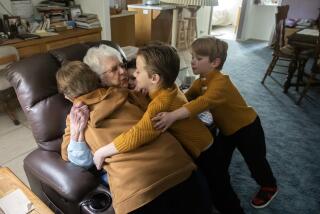For Children, Aunts and Uncles Can Be ‘Cherry on Top’ of Family
- Share via
To the rest of the world, she is Marion Linnert of San Clemente. But to a select group of 38 people, she has a special name: Aunt Honey.
Fourteen of the group are her nieces and nephews. The other 24 are their children, and she is their grand-aunt.
It was her youngest niece--now 23--who gave Linnert the affectionate nickname. “When she was just learning to talk, much to our astonishment she addressed me as Honey,” Linnert says. From then on, the whole family followed suit.
Even though she is a “maiden aunt” with no children of her own, Linnert says that because of her close relationship with her sister’s and brothers’ children, she has a significant family legacy nonetheless.
“I am a part of what was, is and will be,” she says. “No doubt because I am a maiden aunt, they have played a more significant role in my life, and I have been able to reach out and touch each one in one way or another. And they have touched me.”
Long before she became an aunt for the first time in 1945, Linnert had a clear idea of what the role entailed. Two clear and distinct ideas, as a matter of fact, illustrated by her own two aunts.
“From the time we were born until their deaths, Aunt Elsie and Aunt Sylvia were part of the nurturing process for my sister, my two brothers and me,” she says. “Elsie, who lived close to us in Orange and who taught (school for) 39 years in Orange County, helped my mother in caring for us, supported us in our activities and extended a helping hand in time of need.”
Linnert’s other aunt interpreted the role quite differently. “Sylvia, who lived in another town until she retired, had a certain joie de vivre to which we responded. She provided the cherry on top, whether it was See’s chocolate eggs for Easter . . . or a sizable check at Christmas.”
Between the two, Linnert learned that aunts could provide not only practical assistance, but also that extra, off-the-wall something their nieces and nephews might not get from their own parents.
Aunts and uncles can be, as Linnert puts it, “the cherry on top,” precisely because they don’t have the full day-to-day responsibility for their nieces and nephews that parents have, says Marvin Rofsky, a psychologist in Orange. “There’s a very different flavor to the relationship because there is love and care without the discipline that a parent would have to give.
“For the niece or nephew, it can sometimes be a wonderful relationship because you have someone who is almost, in some instances, like a grandparent. And for those who don’t have children of their own, the niece or nephew can be a surrogate child.”
That’s exactly the case for Esther and Don Pearsall of Costa Mesa. Unable to have children of their own, they serve, in a sense, as backup parents to her brother’s 5-year-old son, Eric Blomquist.
Pearsall and her husband, Don, have other nieces and nephews, but they are especially close to Eric because his father, Esther’s brother, has been bringing him up alone for the past 3 years.
“Eric’s daddy is a very caring father and enjoys spending time with Eric, but there are times when he must work weekends or when he has other obligations or activities,” she says. “At these times, Eric usually stays with us. We have a set of pajamas and a toothbrush for spur-of-the-moment stay-overs. The personnel at his preschool and now kindergarten know me since I often pick him up on Friday afternoons, and my husband and I attend many of his programs and open house nights.”
Because Eric is the Pearsalls’ most frequent visitor, their guest room is unofficially known as “Eric’s room.” Two dresser drawers there are filled with his toys, “and he knows that he has access to these and not the others,” Pearsall says. “In fact, we do not have a child-proofed house, but Eric has never handled any object that he is not supposed to and nothing has ever been broken.”
“It’s easier to set the time aside and make it real quality time when you’re not having to deal with having kids in the house 24 hours a day,” Pearsall says. “We don’t always do special things, but we usually plan to do something pleasant for all of us. It’s kind of neat being a part-time parent, in a sense, helping to guide him, and reaping the rewards.”
Already, young Eric has decided that he needs to take care of his aunt too. “My husband was going to be out of town for 3 weeks, and Eric was worried that I would be lonely,” Pearsall says. “So I wrote down my phone number and told him he could call me. Sure enough, a couple of days later, the phone rang and it was Eric saying, ‘I pushed the buttons myself.’ I could hear his father in the background saying, ‘Eric, what are you doing?’ And he said--very seriously--’Dad, I’m talking to my aunt.’ ”
Eric’s parents are divorced, and he has no contact with his mother, so his “Auntie Es” is an important female role model for him.
Joan Smith, who lives in Westminster, has been an aunt for 19 years. But only recently was she able to take on the role actively.
Back in 1969, Smith’s sister gave up her daughter for adoption “because back then, single mothers were counseled that two foster parents were more desirable than one natural parent,” Smith says. “Since I only had one aunt myself and she is the most marvelous aunt anyone could have, I constantly thought about the lost child to whom I was an ‘only aunt.’ ”
Through an organization that helps adopted children find their biological families, Smith was finally able to establish contact with Sharla, her niece.
When she did, she discovered that her niece had become a quadriplegic due to an illness. She also discovered that Sharla’s adoptive mother was willing to welcome her “with the assurance that anyone who can enrich her daughter’s life is a treasured addition to their small family circle. . . . How heartwarming it was to hear her say that she had always included my sister in her prayers and hoped for the day when she could thank her in person for her ‘gift.’ ”
The role of aunt or uncle may be similar to that of grandparent, but to Roz Silva of Garden Grove, “Aunt Betty” Flaty is more like a sister.
“Aunt Betty is only 15 years my senior. She has been an important part of my life since I was a child. First, she baby-sat me, then I baby-sat her children, and now she baby-sits my boys. She has done countless things for me, like showing up at my house with a bag full of groceries the day I arrived home from the hospital to picking me up at the airport in the wee hours of the morning. And always, always with that ever-present smile.”
More to Read
Sign up for Essential California
The most important California stories and recommendations in your inbox every morning.
You may occasionally receive promotional content from the Los Angeles Times.













